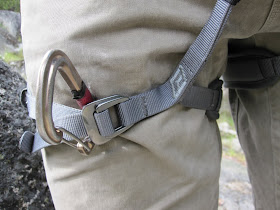I recently was shocked to find a somewhat major problem with my brand new harness. I bought a harness with "fast-buckle" systems. These systems have been around for five years or so, but are becoming an increasingly popular system on harnesses. The fast-buckle is essentially a system that allows you climb into your harness and tighten it up. You don't need to double it back or anything, once it's been tightened, it's supposedly good.
I've always been concerned that these harnesses might cause people to forget to double themselves back if they use a "normal" harness after using a fast-buckle for a period of time. But such a concern is nowhere near as disturbing as what I found when playing with my new fast-buckle harness.
I discovered that the leg-loop can actually unbuckle itself if you clip your rappel back-up friction-hitch directly into it near the buckle. See the following picture for what not to do with your carabiner on your leg-loop.
 Note the location of the carabiner on the
buckle. If you actually had to use a rappel back-up
Note the location of the carabiner on the
buckle. If you actually had to use a rappel back-upclipped to this carabiner, it could potentially cause the buckle to release. Do not do this.
The best thing to do with the friction-hitch back-up in order to avoid an unintentional unbuckling, is to clip it to the leg-loop near the crotch. The strap that goes up to the belay-loop will isolate the carabiner from the buckle and will not allow it to unbuckle.
 A climber set up to rappel properly with the
carabiner to the back-up friction-hitch
A climber set up to rappel properly with the
carabiner to the back-up friction-hitchclipped near the crotch.
Every new piece of equipment has a few bugs to work out and the fast-buckle harnesses are no exception. The problem is that a lack of knowledge on this particular issue could lead to an injury or a fatality. So spread the word far and wide. This is a great invention, but it's really only great if everyone knows its limitations.
--Jason D. Martin

Could be avoided by extending the belay device with a sling and then clipping the autolock prussik to the work loop on the harness. I don't teach people anymore clipping to the leg loop.
ReplyDeleteI would like to add that I find it helpful to extend my belay device with my personal safety sling about 3' and then I can have my back-up clipped or girth hitched to my belay loop. This creates an easy to break position and the extension helps me hang down more comfortably if wearing a pack.
ReplyDeleteThis is fairly obvious, as to loosen the buckle you pull it in the same direction! Metal on metal is never a good idea either
ReplyDeleteInteresting read. I recently had an unexpected failure mode with this system when cleaning gear on rappel, although fortunately I backed myself off by tying & clipping a figure-eight knot out of the slack!
ReplyDeleteI found that chimney & OW climbing badly frays the webbing right at the buckle. Since leg loops are not critical to harness safety (the waist loop is, but the loops are more for comfort when hanging in the harness), I let it wear, with the expectation that I would replace the harness once the leg loop wore out. So I was surprised when this worn part of the leg loop snapped, releasing the backup autoblock! In response I'm trying to find a harness without this buckle for OW & chimney climbing in hopes that it lasts longer (last harness was 1 year old), and keeping in mind the effect that a worn leg loop might have on a rappel backup.
Black Diamond harnesses have a little loop that's created by the stitching next to the buckle. My understanding is that this loop is there to clip a carabiner through for this exact purpose. Can anyone confirm that this is the intended purpose for that loop?
ReplyDeleteIf that is the case, I suppose the accompaning instruction-sheet would explicitly says so
DeleteIf you extend it with a sling so you can have the backup on the belay loop, put the extension through the rope loops instead of the belay loop.
ReplyDeleteIt's safer not to have everything relying on one singe attachment point
@Brad NO DON'T USE THAT, based on what you described it sounds like the belt loop used to keep the webbing out the way. You could probably rip that thing off just by yanking it hard enough
ReplyDeleteThe rope and belay loop pass through the leg swami and waist swami. However we really on the single attachment to a belay loop every time we belay a climber. Why wouldn't we trust the single attachment point to repel?
ReplyDeleteYou are not supposed to use the leg loop for that anymore!
ReplyDeleteMany new harnesses have a small loop back on the leg loop behind the buckle, you can use this loop to keep the crab with the prusik on away from the buckle, this is designed for the purpose but should not be confused with elastics for retaining spare webbing. Clipping through this loop but also incorporating the leg loop itself is the best option if you don't want to extend your abseil device away from your harness so that the back up can be attached to the belay loop.
ReplyDeleteI always extend my rap device and attach my backup to the belay loop. If I somehow manage to mis-clip my device and it fails, the backup on my belay loop will hold me in an upright position. If it’s clipped to my leg loop, I’m suddenly in a very precarious position.
ReplyDelete